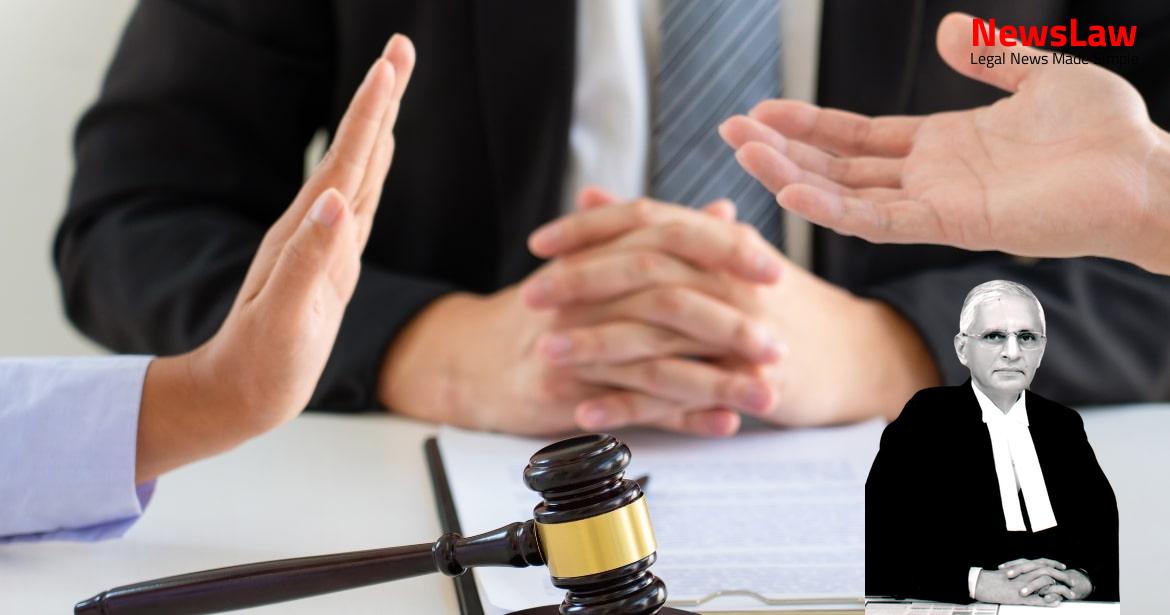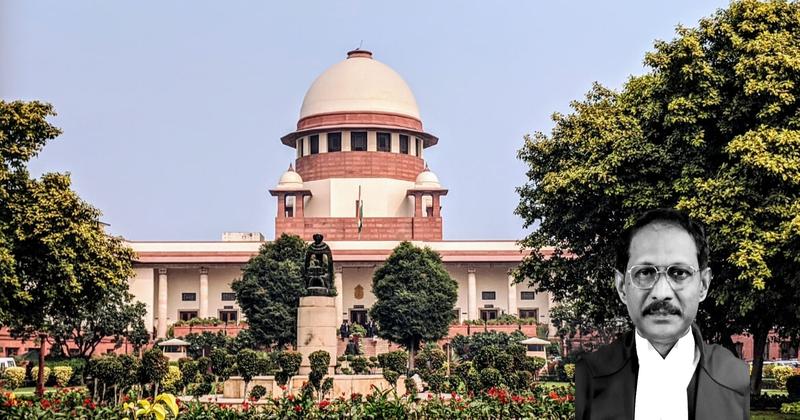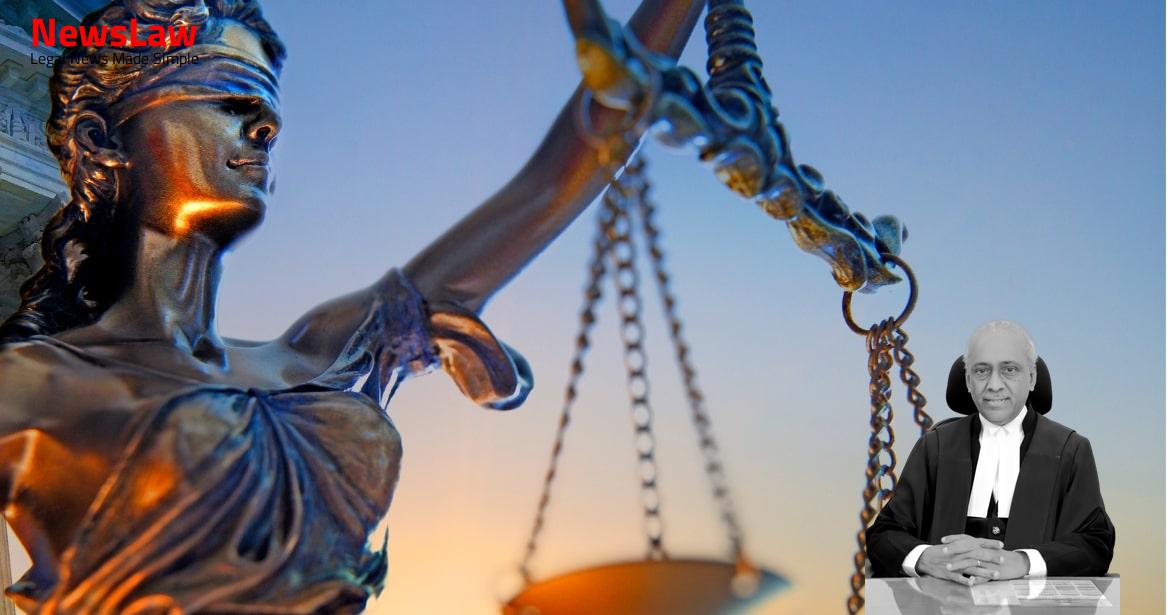Explore the intricate legal analysis undertaken by the court in the context of dismissing appeals in criminal cases. The judgment sheds light on the importance of upholding procedural fairness and ensuring that appeals impacting the liberty of the accused are carefully considered. Discover how the court navigated complex legal principles and constitutional provisions to arrive at its decision, setting a significant precedent for future legal proceedings.
Facts
- Petitioner Sandeep alias Kala was tried as the second accused in Sessions Case 9 of 2005.
- Four accused were put up for trial for offences under Section 302 read with Section 34 of the Indian Penal Code 1860 and Section 25 of the Arms Act 1959.
- The criminal case originated from FIR No 59 dated 15 February 2005 filed at PS Civil Lines, Sonepat.
- The charge-sheet was sent for trial to the Sessions Court by an order dated 6 June 2005 of the Additional Chief Judicial Magistrate, Sonepat.
- Notice was issued on 9 July 2018.
- The petitioner (A-2) and Ravi Kant (A-4) were acquitted by the Additional Sessions Judge.
- The High Court upheld the conviction of Arun (A-1) and Sunil (A-3).
- State of Haryana challenged the acquittal of the petitioner and Ravi Kant, which was allowed by the High Court.
- Both the petitioner and Ravi Kant were held guilty of offences under Section 302 read with Section 34 IPC.
- They were sentenced to life imprisonment along with a fine of Rs 20,000 each.
- Plea of alibi by the petitioner and Ravi Kant was examined by the High Court.
- A criminal appeal filed by Ravi Kant had his acquittal reversed by the High Court.
- The appeals against the conviction and acquittal were heard and disposed of by a Division Bench of the High Court.
- The conviction and sentence imposed upon the petitioner have attained finality after dismissal of the appeal and review petition.
Also Read: Balancing Power and Transparency: Electoral Bonds Struck Down, Disclosure Mandated
Arguments
- The petitioner filed a Writ Petition under Article 32 of the Constitution challenging the deletion of clauses (c) and (d) from Rule 15(1) of Order XXI of the Supreme Court Rules 1966 by the Amendment Rules 1981.
- The petitioner sought a declaration that the deletion was contrary to the law laid down in the Sita Ram case by a Constitution Bench.
- They also sought a declaration that the absence of guidelines in Order XX, Rule 21 of the Supreme Court Rules 2013 for preliminary hearing in appeals under the Enlargement of Criminal Appellate Jurisdiction Act is unconstitutional.
- The petitioner requested a direction restraining the respondent from implementing Order XX, Rule 21 of the 2013 Rules.
- The petitioner argued that the deletion of provisions in 1981 was not consistent with the Sita Ram judgment regarding Rule 15(1)(c) of Order XXI in the context of the Enlargement of Jurisdiction Act.
- Discretion left with the Court to summarily dismiss a criminal appeal on an ex parte basis in exceptional circumstances.
- Appeal and review by petitioner already dismissed, co-accused’s appeal upheld in a comprehensive judgment.
- Absence of guidelines in Rule 21 of Order XX of the 2013 Rules not impacting the Court’s power.
- The Constitution Bench in Sita Ram case recognized the Court’s power to dismiss an appeal at a preliminary hearing.
Also Read: Recall of Resolution Plan Approval: Legal Analysis
Analysis
- The Enlargement of Jurisdiction Act was enacted by Parliament in accordance with Article 134(2) of the Constitution.
- The judgment emphasized the importance of substantive content in conferring the right of appeal to the accused.
- The Full Court meeting on 6 August 1979 emphasized the right of appeal under Article 134 as a crucial part of the legal procedure for protecting life and personal liberty.
- The Court considered challenges to Rule 15(1)(c) of Order XXI from the perspective of Article 21.
- The amendment to Rule 15(1)(c) of Order XXI, introduced by The Supreme Court (Amendment) Rules 1978, aimed to provide greater clarity and conformity with the Constitution Bench’s judgment in Sita Ram.
- The deletion of Rule 15(1)(c) was to ensure appeals were not disposed of summarily ex parte without notice, as per the principles in the Constitution Bench ruling.
- The aim behind the deletion was to follow the mandate of the Constitution Bench which emphasized issuing notice, recording reasons, and ensuring fair procedure in the disposal of appeals under Article 134(1)(a) or (b) or Section 2 of the Enlargement of Jurisdiction Act.
- The dismissal of appeals at preliminary hearings is considered an exception, with the Court cautioning against routine disposal without due process.
- The distinction between the right of appeal and the grant of leave was highlighted, noting the importance of upholding distinct procedures as specified by the Constitution and Parliament.
- The amendment sought to align the rules with the principles laid down in Sita Ram and ensure that appeals impacting the liberty of the accused are considered judiciously.
- By virtue of clause (a) of Section 2 of the Enlargement of Jurisdiction Act, an appeal lies before the Supreme Court where the High Court has reversed the acquittal of an accused and sentenced him to life imprisonment or imprisonment for at least ten years.
- Parliament expanded the jurisdiction of the Supreme Court in criminal cases through the Enlargement of Jurisdiction Act under Article 134(2) of the Constitution.
- Article 145 of the Constitution empowers the Supreme Court to make Rules regulating its practice and procedure, including matters specified under it.
- Parliament can confer further powers to the Supreme Court to entertain appeals from a judgment, final order, or sentence in a criminal proceeding of a High Court under Article 134(2), subject to specified conditions and limitations.
- Section 379 of the Code of Criminal Procedure 1973 allows an appeal to the Supreme Court if the High Court has reversed an order of acquittal, convicted the accused, and sentenced him to death, life imprisonment, or imprisonment for ten years or more.
- Article 134 of the Constitution grants appellate jurisdiction to the Supreme Court in criminal matters, including certification by the High Court that a case is fit for appeal to the Supreme Court.
- Sub-clause (b) of clause (1) of Article 134 provides for an appeal to the Supreme Court if the High Court has reversed an order of acquittal and sentenced the accused to death.
- Notice must be given in cases where a fuller hearing would serve a purpose.
- Procedure established by law must be fair, just, and reasonable.
- Rule 15(1)(c) of Order XXI of the 1966 Rules and Section 384 of CrPC were upheld by reading down their scope, substance, and intent.
- Appeals falling within the ambit of Article 134(1)(a) or (b) or under the Enlargement of Jurisdiction Act should not be disposed of at a preliminary hearing without notice, records, and reasons.
- Both parties should be present for a hearing with records available, and reasons must be provided while disposing of the appeal.
- Appeal dismissed on the judicial side and review dismissed against that judgment
- Judgment of the Court dismissing the appeal lacked reasons
- Clarification on modalities for entertaining appeals under Article 134(1)(a) or (b) or Section 2 of the Enlargement of Jurisdiction Act
- Limitation on issuing contrary direction under Article 32 of the Constitution
Decision
- The court did not make any specific finding on the consequence of the dismissal of the appeal by the co-accused (A4) on the petitioner’s remedies in law.
- The petitioner is free to pursue the remedies available in law despite the dismissal of the appeal by the co-accused.
- The petition has been disposed of.
- Any pending applications have also been disposed of.
Case Title: SANDEEP ALIAS KALA Vs. SUPREME COURT OF INDIA THROUGH SECRETARY GENERAL (2022 INSC 835)
Case Number: W.P.(Crl.) No.-000143 / 2018



